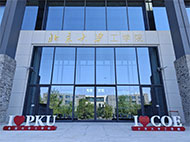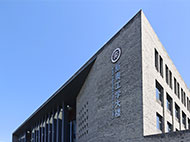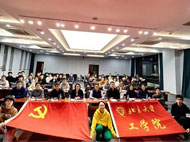题目:Designer Self-assembling Peptides for Nanobiotechnology
报告人:张曙光 博士
Associate Director of the Center for Biomedical Engineering, Massachusetts Institute of Technology
主持人:罗莹 特聘研究员
时间:6月16日(周一)下午5:00
地点:北京大学力学楼434会议室
欢迎感兴趣者参加!
联系人:北京大学工学院生物医学工程系 葛子钢
报告摘要:
There are two complementary technologies that can be used in the fabrication of new biological materials for nanomedical technology. In the 'top-down' approach, biomaterials are produced by polymerizing homogeneous monomers into covalently linked microfibers, sheet, coatings and other structures. This contrasts sharply from bottom up approach, where biological materials are assembled heterogeneous population of molecules to produce supra-structures and diverse architectures. The latter approach will become an integral part of biological materials production in the coming years. This approach requires our deep understanding of individual molecular building blocks, their structures, assembling properties and dynamic behaviors. Two key elements in molecular nanobiological material production are chemical complementarity and structural compatibility, both of which require the weak and noncovalent interactions that bring building blocks together during self-assembly. Significant advances have been made at the interface of materials chemistry and biology, including the design of helical ribbons, peptide nanofiber scaffolds for three-dimensional cell cultures, regeneration medicine, and molecular ink peptides for arbitrary printing and coating surfaces. These designer self-assembling peptides have far reaching implications in broad spectrum of applications in biology, medicine and nanobiomedical technology, some of which are beyond our current imaginations.
报告人简介:
Zhang is a member of American Association of Advancement for Science, American Society of Biochemistry and molecular Biology, the Human Genome Organization Americas, the Protein Society, New York Academy of Sciences, International Society for the Study of Origin of Life, and Sigma Xi. He is a 2003-2004 Fellow of Japan Society for Promotion of Science (JSPS fellow) and a 2005 Fellow of Japan Advancement for Medical Instrument. His work on designer peptide scaffold won 2004 R&D100 award. His and his colleagues' work on biosolar energy was selected to be the Top 100 Science Stories in 2004 by Discover Magazine. His work on bio-solar energy was selected to be one of 10 finalists of the 2005 Saatchi & Saatchi Award for World Changing Ideas. He is one of the 2006 John Simon Guggenheim Fellows and 2006 recipient of the Wilhelm Exner Medal of Austria.










